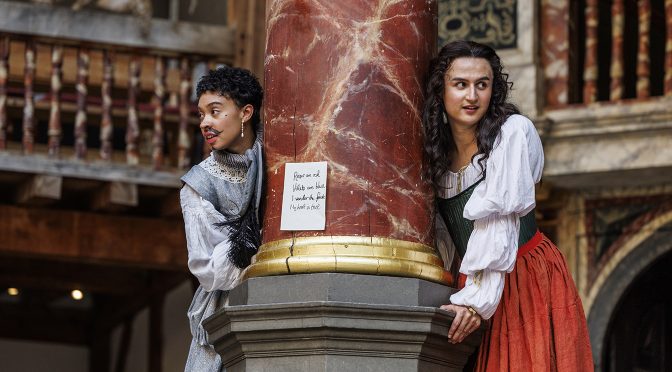The potential for Queer interpretations when it comes to this Shakespeare romance is clear. Putting a spin on our heroine Rosalind’s role-playing isn’t new (Cheek By Jowl’s 1991 production is still my favourite example). But director Ellen McDougall’s production, which embraces all kinds of identities, is full of ideas and a hell of a lot of fun.
McDougall and her cast enjoy the venue. As well as the gender-fluid casting, there are plenty of touches, like the audience participation, that feel characteristic of Shakespeare’s Globe. The energy is high, especially from our lead lovers Rosalind and Orlando, played by Nina Bowers and Isabel Adomakoh Young respectively, who both bound around the stage. There’s strong comedy from Macy-Jacob Seelochan’s Celia (a very neat performance) and Alex Austin’s Jaques. Ambiguity is emphasised and difference played with to raise questions.
Transformation is the key: this forest of Arden is a place full of potential. The Queer politics are as broad as possible – the approach might be called holistic. Ideas about nature run through the show (lavender and apples are handed out to the audience). Much is made of Orlando’s servant Adam dying, with an effort not to throw “unregarded age” into a corner but see it as part of cycle of life. It’s a shame that, despite a strong performance from Stephanie Jacob, the moment isn’t moving. But the ideas are interesting and have a firm base in Shakespeare.
The music, which features heavily, isn’t a successful as it could be. Using pop songs in Shakespeare is common enough, but mashing up well-known tunes is complicated. Composer Michael Henry’s work is accomplished but proves too much for a cast who are not, primarily, singers. Max Johns’ costumes, though, are excellent, embodying the show’s intelligence and sense of rebellion. Johns transforms elements of historic clothing to play with gender and sexuality. Each outfit is bright, fun and smart in every sense of the word.
As You Like It isn’t as enlightened as most of us would like. There’s no ignoring misogyny or class and, in the end, order is (quickly) re-established. But if anywhere kicks against preserving Shakespeare just for the sake of it, it’s here. The production has additional text from Travis Alabanza to boost ideas about family and friendship. Efforts are made to emphasise joy and jokes. And, if things get too tricky, we’re told we are going to skip to the next scene! This is the night’s finest, winning moment. McDougall bring a sense of honesty – of working things out – that is exciting.
Until 29 October 2023
Photos by Ellie Kurttz


